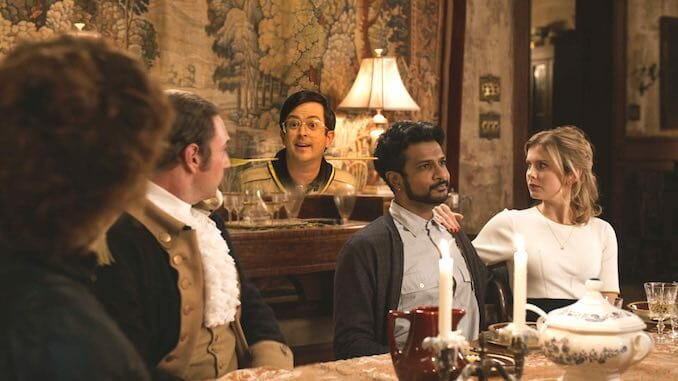From Its BBC Roots to a New CBS Adaptation, Ghosts Remains a Genial Comedy
Photo Courtesy of CBS
It is at this point dead (ha) normal for American studios to mount remakes of popular British shows. Some find runaway success—The Office, American Idol, Veep, Three’s Company, Dancing with the Stars. Others, meanwhile—Coupling, Skins, or (to my specific eternal disappointment) Taskmasters—prove to be absolute flops. Most, though, land somewhere in the middle. Being Human? Fine. Getting On? OK. Sirens? Yeah, sure, why not.
Still, for as unremarkable as the American British remake has generally become over the last several decades, today’s Anglophilic audiences have something that their counterparts over the last several decades, critically, didn’t: HBO Max.
Well, more broadly, today’s audiences have streaming, which comprises a wide enough variety of services that just about anything can be accessed, from just about anywhere in the world, so long as you’re willing to shell out for another monthly subscription. If what you want to keep up with is British comedies (that aren’t Fleabag), though, HBO Max is the place to be. And this month, if what you want specifically to keep up with is a running tally of all the creative decisions CBS made in translating the BBC One sitcom, Ghosts, for its primetime American audiences, HBO Max is *especially* the place to be.
Originally developed by half a dozen members of the comedic team behind Horrible Histories and Yonderland—Mathew Baynton, Simon Farnaby, Martha Howe-Douglas, Jim Howick, Laurence Rickard, and Ben Willbond—the BBC version of Ghosts has a much broader sensibility than American audiences (who are more recently used to the drier, more cerebrally deadpan humor of Catastrophe, This Way Up, or Starstruck) might anticipate. More “house-share” sitcom than anything, Ghosts follows the misadventures of young (living) London couple Alison and Mike Cooper (Charlotte Ritchie and Kiell Smith-Bynoe) as they move into Button House, the dilapidated country manor Alison inherits in the pilot’s opening act from an elderly and very distant posh relative she never knew she had. The catch? Button House just so happens to also be haunted by a whole heap of ghosts from just about every historical era imaginable.
These ghosts—having, by the time we and Alison first meet them, already spent decades (if not, in some cases, centuries) getting on each other’s nerves—form the backbone of the sitcom’s “house-share” humor. Played by the entirety of the series’ creative team (with an assist from Lolly Adefope and Katy Wix), the spirits of Button House allow, collectively, for pretty much every type of comedically ripe personality clash imaginable. In one corner you have Martha Howe-Douglas’s buttoned-up Lady Button, forever admonishing her housemates for their lewd manners and uncouth language. In the next you have Adefope’s friendly-but-naïve Georgian noblewoman, Kitty, who literally doesn’t know the meaning of the word “boundaries.” There’s also Lawrence Rickard’s chess and chaos-loving caveman, Robin, and Jim Howick’s ‘80s-era scout leader, Pat, who’s never met a mouse he’d be willing to scare. As for Mathew Baynton’s failed Romantic poet? Eternally on the nerves of Ben Willbond’s austere (and closeted) WWII Captain, to whom romance itself feels like war.
On their own, the Button House ghosts make for solid enough sitcom fodder. It’s the addition of Alison and Mike, though—the former who gains the ability to interact with her new ghostly housemates after taking a nasty, near-death fall out a second-story window—that makes the series worth watching. With Alison and Mike around, the narrative can have real, tangible goals—the repair of the East Wing plumbing, say, or the installation of a new roof. With their entire life savings wrapped up in the property, the story takes on real stakes, leaving the Coopers on a constant hunt for potential income streams, any one of which the ghosts’ antics might, at any given moment, put in jeopardy. That Alison almost immediately assumes an attitude of aggrieved resignation in the face of her new role as living-dead intermediary only makes the set-up more compelling. There is nothing scary about the ghosts in Ghosts, save for the fact that at any minute, Simon Farnaby’s disgraced, half-dressed Julian Fawcett, MP, might accidentally (or not) flash his junk.
Aside from the fact that CBS feels like the weirdest possible fit for a series like this, full-stop, the American version of Ghosts—which will be sandwiched on the network between a Young Sheldon and United States of Al double-header alongside the Season 6 (!) premiere of Bull—is nevertheless a fair imitation of its British predecessor. Dilapidated old country estate? Check. A pile of eccentric, bickering ghosts stretching back to the continent’s earliest recorded history? Check. A young, big city couple suddenly in over their financial heads? Check. A near-death bonk on the head that renders the wife a spiritual intermediary? Check!
-

-

-

-

-

-

-

-

-

-

-

-

-

-

-

-

-

-

-

-

-

-

-

-

-

-

-

-

-

-

-

-

-

-

-

-

-

-

-

-








































